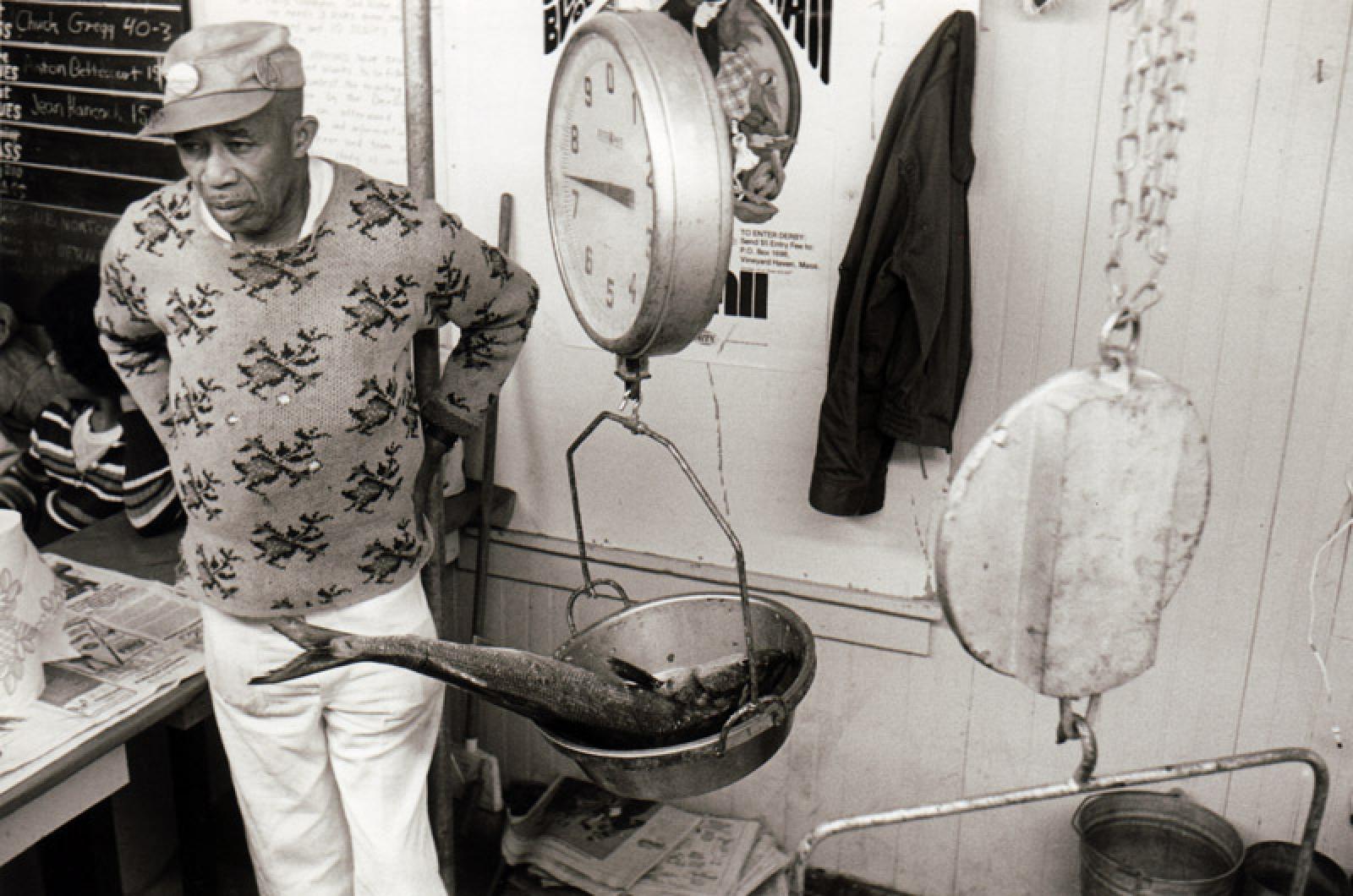From the October 1, 1965 edition of the Vineyard Gazette by Joseph Chase Allen:
The nightly scene at the weighing-in station in Oak Bluffs, is an aspect of the annual bass derby that has never been adequately described.
The derby committee has invariably selected a place for weighing-in with ample space and the weighing-in station by night is a scene with an atmosphere of sociability and good nature. In the assembly there usually may be counted fifty to a hundred persons, young and old, fishers and non-fishers, all deeply interested and enjoying the companionship and procedure.
Contestants in the derby are interested in the list of prizes which covers the walls, flamboyantly announcing what the largest bass or blue will win, daily, weekly, or the monthly period, the prize for the greatest poundage and so on.
These fishermen tramp in, bearing one fish each, perhaps, or a basketful, a galvanized ash barrel overflowing, depending upon where they have been and what luck they encountered.
There are the women participants, who may well be wearing foul weather gear, dungarees and boots, who have fish to be weighed, small boys, some very small indeed, dragging their catch because they are not tall enough to keep the tails off the ground, and even clasping large, slimy specimens to their bosoms, as they appear, eyes alight with the spirit of contest.
These visitors are not likely to remain long. Only a few of the veterans will linger, swapping ideas and notes with one another, as to the lures used, perhaps, or the weight of line, but seldom mentioning the place where they fished. Even the mainland visitors know where the best fishing spots lie, especially visitors who cast from the beaches, but when they talk about locations they are vague, “oh, I fished the Sound Shore,” they say, or “South Beach.” They do not speak of the Split Rock, Pilot’s Landing or Cedar Tree Neck. If they speak of Wasque, they merely refer to their own place as being in the vicinity.
But the gallery is noteworthy, those persons who come to see, to gather in groups, and talk about everything under the sun except fishing. In this group are the young wives who complain with a smile, that they are the “derby widows,” and they will say that they see little of their husbands, by night or day during the contest.
There are snowy-haired women who never miss an evening at the weighing-in station. They will leap from their seats, for oh, yes, indeed, the derby committee always provides seats, and rush to look at the scales when an extra-large fish is weighed.
There are also elderly men, and some not so elderly, who linger on the fringe of the crowd, watching. Although many are seated, there is always a milling throng clustered closely about the scales, and the spot where the fish are laid out for weighing. Fishermen bringing in their catches must bore a way through this gathering, but no one ever complains about the crush, no one even exclaims if a garment is brushed by a three-foot bass carried by a contestant.
There comes a time in the course of the evening when fishermen begin to dispose of their fish, or some of them.
In these nightly gatherings may be found residents of every Island town. That the visitors delightedly carry away fish in large numbers every evening is but a part of the program. The sociability which results from such gatherings, the evident enjoyment as they meet friends and neighbors, is something the derby committee never foresaw or even imagined.
One might suppose that someone would be irritated at times. The committee, weighers and checkers, are busy persons. They have an exacting job to do and they must concentrate upon it. And the contestants are likewise earnestly competing, alert to see every official move. But they take all this as a matter of course. They are polite to the elderly, considerate of the juvenile contestants and of each other, and they are smiling as they leave the place. For after all, the derby is twenty years old, and many of the participants have entered each one from the beginning.
Though they come from far-off places, they have made acquaintances at the weighing-in station, and to some degree they also mingle socially with the gallery, and depart reluctantly, because derby fishermen must make a long day indeed, and some of these men may return to the beaches after they have weighed in their catch for the day. But the gallery disperses slowly, some leaving as soon as they receive a fish or two, others lingering until the place is closed for the night, and even then pausing outside to continue their conversations. The evenings at the weighing-in station illustrate lack of artificial heat, hard seats or a scarcity of seats, and the smell of fish which pervades the place, not to mention the occasional spatter of slime and scales. All this has become a colorful part of the derby.
Compiled by Hilary Wall
library@mvgazette.com




Comments
Comment policy »